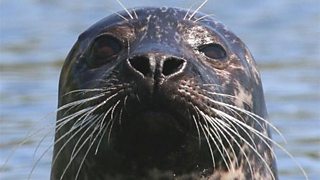Latest report from Ramsey Island courtesy of the RSPB:
Every autumn between 400 to 500 white-coated pups are born on the island's beaches and in its caves, by mid September this year there were over 100 pups to be seen on the island's beaches.
Each year the RSPB follows the progress of pups born on nine beaches around Ramsey Island, these sites are chosen because they can be safely viewed from the cliff top.
The beaches only account for around 50% of the total pups born on the island each year, the other half are born in Ramsey's sea caves, where there is little chance of seeing the pups inside.
Images courtesy of RSPB:

Lisa Morgan is assistant warden on RSPB Ramsey Island and is responsible for seal pup monitoring, she said: "The beach sites give us an indication of pup production and the timing of the pupping season.
This year we had a very early start to the season with three times as many pups by the end of August than at the same time last year, so it'll be interesting to see how the rest of the season pans out."
Motherhood for grey seals is a short-lived process, with pups only feeding for around 18 days. By 21 days the pup will have lost its white coat completely, be fully weaned and left to it's own devices.
September and October are the best months to see grey seals and visitors to the island can look and listen for the females and their white fur-clad pups on the beaches, and spot the large dark-skinned males patrolling just off shore.
The island is open until the end of October (weather permitting) to allow people the chance to experience this spectacular sight for themselves.
Visitors can catch the boat across to the island from the lifeboat station at St Justinians, and meet one of the warden's who will explain where the best places are for seeing the pups.
Seals are protected by law at their breeding sites, so if you are out and about this autumn looking for seal pups, be it by boat or kayak, you can about how to avoid disturbing these animals - RSPB
Meanwhile ...
Gull
